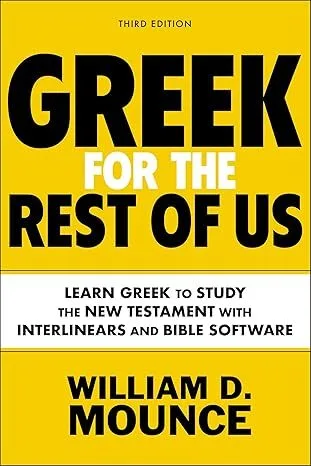Pronunciation Guide: eh’-ger-sis (emphasis on first syllable)
Basic Definition

Key Information
ἔγερσις

Strong’s Entry
g1454
Strong’s G1454: ἔγερσις (egersis) refers to the act of rising up or awakening, specifically in the context of resurrection from the dead. This powerful noun encapsulates not merely a return to life but a divine transformation from death to new life. In its biblical usage, ἔγερσις represents the ultimate demonstration of God’s sovereign power over death and the grave.
Etymology and Morphology
- Noun (feminine)
- Derived from the verb ἐγείρω (egeirō, G1453) meaning “to awaken, to raise up”
- Indo-European root *ger- (“to awaken, arise”)
- Primary usage in narrative contexts describing resurrection
- Appears only once in the New Testament (Matthew 27:53)
- Related to words denoting awakening and arousal in classical Greek
ἔγερσις Morphology:
- ἔγερσις (nominative singular) – resurrection, rising up
- ἐγέρσεως (genitive singular) – of resurrection
- ἐγέρσει (dative singular) – in/with resurrection
- ἔγερσιν (accusative singular) – resurrection (as direct object)
Origin & History
The word ἔγερσις emerges from a rich linguistic background in classical Greek literature where its root verb ἐγείρω was commonly used to describe waking from sleep or rising from a seated position. In Euripides’ works, forms of ἐγείρω appear when describing those roused from slumber, while Plato employs it in “Phaedo” when discussing the soul’s awakening to knowledge.
In the Septuagint (LXX), the verbal form ἐγείρω appears frequently, particularly in passages like Psalm 40:3 (LXX 39:3) where God “raises up” (ἤγειρέν) the psalmist from destruction. The noun form ἔγερσις, however, is remarkably rare, making its single New Testament appearance all the more significant. Early Church Fathers like Ignatius of Antioch and Justin Martyr expanded on this resurrection terminology, with Justin particularly using the concept of ἔγερσις in his “Dialogue with Trypho” when discussing the resurrection of the Messiah as the firstfruits of all who would be raised.
Expanded Definitions & Translation Options
- The divine act of raising from death to life
- A supernatural awakening from the sleep of death
- The transition from mortality to eternal life
- The demonstration of God’s power over death
ἔγερσις Translation Options:
- Resurrection – The most common translation, emphasizing the complete restoration to life after death
- Rising up – Highlights the active motion from a lower state (death) to a higher state (life)
- Awakening – Emphasizes the metaphorical concept of death as sleep, from which one is awakened
- Quickening – An older English term that captures the infusion of life into that which was dead
- Revival – Suggests the return of life and vitality to that which had lost it
Biblical Usage
The term ἔγερσις appears uniquely in Matthew 27:53, in the extraordinary account of the saints who were raised from their tombs at the moment of Yeshua’s death. The text states they “came out of the tombs after His resurrection (ἔγερσιν)” and appeared to many in Jerusalem. This singular usage connects this rare noun directly to the most significant theological event in human history – the resurrection of the Messiah.
While the noun form appears only once, the verbal root ἐγείρω appears frequently throughout the New Testament, particularly in resurrection contexts. The Gospel writers consistently use forms of ἐγείρω when recording Yeshua’s predictions of His resurrection and when describing the actual event. Paul likewise employs this terminology extensively in his discourse on the resurrection in 1 Corinthians 15.
- “and coming out of the tombs after His resurrection [ἔγερσιν], they entered the holy city and appeared to many.” Matthew 27:53
Cultural Insights
In ancient Jewish thought, resurrection was understood primarily as a collective event that would occur at the end of the age. The Pharisees affirmed bodily resurrection, while the Sadducees denied it entirely. This theological division is reflected in passages like Acts 23:6-8, where Paul strategically plays on this disagreement.
The concept of resurrection in Second Temple Judaism was shaped significantly by texts like Daniel 12:2 and Isaiah 26:19, which clearly speak of the dead awakening to life. By the first century, the concept of תחיית המתים (techiyat ha-metim, “resurrection of the dead”) had become a central tenet for many Jews, appearing as the thirteenth article of faith in later rabbinic tradition. What makes the Christian proclamation of ἔγερσις so revolutionary is not merely the concept of resurrection itself, but the claim that it had occurred already in the person of Yeshua, as a firstfruits of what was to come for all who believe.
Theological Significance
The concept of ἔγερσις lies at the very heart of New Testament theology and the gospel message. Yeshua’s resurrection represents the Father’s divine seal of approval on His sacrificial work and the definitive victory over sin, death, and the powers of darkness. As Paul emphatically states in 1 Corinthians 15:17, “if the Messiah has not been raised, your faith is futile; you are still in your sins.”
The resurrection of Yeshua also serves as the prototype and guarantee of the believer’s future resurrection. In Romans 8:11, Paul assures believers that “the Spirit of Him who raised Yeshua from the dead… will also give life to your mortal bodies.” This magnificent promise means that ἔγερσις is not merely a historical event but a present reality that transforms our understanding of death and life. For the believer, death has been stripped of its ultimate power and transformed into a doorway to eternal life in the presence of יהוה (Yahweh). The resurrection demonstrates God’s complete sovereignty over the created order and His power to bring about the new creation promised throughout Scripture.
Personal Application
Understanding the power of ἔγερσις transforms how we face the reality of death and suffering in our lives. Since we serve a God who has demonstrated His power over death itself, no situation we face is beyond His redemptive reach. When we encounter seemingly hopeless circumstances – broken relationships, financial ruin, serious illness, or profound loss – we can remember that the same power that raised Yeshua from the grave is at work in our lives (Ephesians 1:19-20).
The resurrection power of ἔγερσις also invites us to see our daily spiritual walk as a continuous experience of dying to the old self and rising to newness of life. As Paul explains in Romans 6:4, “We were therefore buried with Him through baptism into death in order that, just as the Messiah was raised from the dead through the glory of the Father, we too may live a new life.” Each day presents an opportunity to allow the resurrection power of God to transform those areas of our lives that need to experience His life-giving touch.
Related Words
- ἀνάστασις (anastasis) [an-as’-ta-sis] – resurrection, especially emphasizing the standing up or rising up aspect of coming back to life; used more frequently in the New Testament to refer to resurrection. See G386
- ζωοποιέω (zōopoieō) [zo-op-oy-eh’-o] – to make alive, to give life, to quicken; emphasizes the life-giving aspect rather than the rising up. Used by Paul to describe the life-giving power of God. See G2227
- ἐγείρω (egeirō) [eg-i’-ro] – to awaken, to raise up; the verbal root from which ἔγερσις derives. Much more common in the New Testament, appearing in numerous resurrection contexts. See G1453
- ἐξανάστασις (exanastasis) [ex-an-as’-ta-sis] – a rising up from, out-resurrection; a compound term used by Paul in Philippians 3:11 to refer to a special resurrection from among the dead. See G1815
- ἔξοδος (exodos) [ex’-od-os] – a way out, departure; used metaphorically for death, but in Luke 9:31 specifically refers to Jesus’ “departure” (death, resurrection, and ascension) from Jerusalem. See G1841
Did you Know?
- The extraordinary event described in Matthew 27:53, where saints experience ἔγερσις and appear to many in Jerusalem, is found nowhere else in ancient literature. This unprecedented account suggests that Yeshua’s resurrection power was so overwhelming that it spilled over to affect others even before His own resurrection was complete, demonstrating His absolute authority over death.
- While Greek philosophy generally viewed the material body as a prison from which the soul sought release, biblical ἔγερσις insists on the resurrection of the body. This represents a radical departure from Hellenistic thought and affirms the Hebrew understanding that God’s creation, including the physical body, is fundamentally good and worthy of redemption rather than escape.
- Contemporary medical science has documented numerous cases of people being resuscitated after clinical death, but these experiences differ fundamentally from biblical ἔγερσις. Resuscitation returns one to the same mortal life, while resurrection in the biblical sense transforms the body into an imperishable state (1 Corinthians 15:42-44). This distinction highlights the unique, supernatural nature of Yeshua’s resurrection and the future resurrection promised to believers.
Remember This
ἔγερσις isn’t merely about returning to life but being transformed into a new creation where death has permanently lost its sting, demonstrating that with יהוה (Yahweh), even the grave itself must surrender its claim on those who belong to Him.
Note: While this entry strives for accuracy, readers engaged in critical research should verify citations and keyword occurrences in their Bible translation of choice. For Biblical citations, the F.O.G Bible project recommends Logos Bible software.
Strong's g1454
Add Comment
God's Word is too vast for a single perspective. We all have a story, and as believers we all carry the Holy Spirit who is the Revealer. With this in mind - I would love to read your comments.




